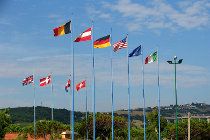World Mayor’s Council on Climate Change summit
This year the World Mayor’s Council on Climate Change will be conducting a summit, eight days before the 16th Conference of the Parties (COP16) in Mexico. The summit will be held in Mexico City and will be attended by more than 3,000 mayors from all over the world.

This year the World Mayor's Council on Climate Change will be conducting a summit, eight days before the 16th Conference of the Parties (COP16) in Mexico.
The summit will be attended by representatives from local governments and cities around the world, the World Mayors Council on Climate Change (WMCCC) and the Local Governments for Sustainability (ICLEI) and the United Cities and Local Governments (UCLG).
Anke Stroffregen, ICLEI communications manager, said: "The summit is very much about the mayors taking the leadership role and pulling their strength together to show that they are willing to make commitments and that they are able to deliver actions as well."
Within the pact is the Carbon Cities Climate Registry, a registry that commits mayors and local governments to record their carbon emissions. It is anticipated that a policy like this will be a good way to help the progress on formulating a successor to the Kyoto Protocol at COP16, and to make sure that there is a permanent prospect of action on halving carbon emissions.
Due to the urban movement, over half of the world's population now lives in cities. Research has been done by the International Energy Agency, who discovered that cities accounted for two-thirds of the world's primary energy demand in 2006, contributing 70 per cent of global carbon dioxide emissions.
Stroffregen said: "With more and more people living in urban areas it becomes more important that we realise that we have to provide for a more varied lifestyle. People who live in cities have an enormous power to demand of their local governments an improvement in their climate policy."
Cities and mayors in developing countries face hardship in keeping up with the pace of mayors of cities in developed countries due to the added pressure of rising poverty levels and combating the economic slump.
Mayor Marcelo Ebrard of Mexico City is just one such mayor. Ebrard views making Mexico City 'green', as one of his most important tasks as mayor.
Mexico City is one of the largest cities in the world, and has a high number of carbon dioxide emissions and other greenhouse gases due to the high number in cars and buses. As mayor, Ebrard has started creating more bus routes and bicycle programs in his poverty stricken city. He is also trying to increase water rates to help with lack in funding.
He believes that with $1 billion a year to fund transport, water and energy projects will make his green plan become a reality. He says that actions like expanding the bus service to reduce auto traffic and saving trees in Mexico City can cut carbon emissions by seven million tonnes between 2008 and 2012.
This subject – urban sprawl overrunning green areas – is going to be a hot topic at COP16, as they try to think of ways to turn these impoverished cities.
Ebrard is desperate to try and decrease his city's emissions, and to show other developing countries that it can be done, the developing world can help combat climate change too.
Author: Charity Knight | Climate Action
Image: Pizzodisevo | flickr






